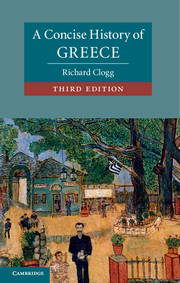Book contents
- Frontmatter
- Dedication
- Contents
- List of Illustrations
- Preface
- 1 Introduction
- 2 Ottoman rule and the emergence of the Greek state 1770–1831
- 3 Nation building, the ‘Great Idea’ and National Schism 1831–1922
- 4 Catastrophe and occupation and their consequences 1923–49
- 5 The legacy of the civil war 1950–74
- 6 The consolidation of democracy and the populist decade 1974–90
- 7 Balkan turmoil and political modernisation: Greece in the 1990s
- 8 Greece in the new Millennium: from affluence to austerity
- Biographies
- The Royal Houses of Greece
- Presidents
- Tables
- Key Dates
- Guide To Further Reading
- Index
2 - Ottoman rule and the emergence of the Greek state 1770–1831
Published online by Cambridge University Press: 05 June 2014
- Frontmatter
- Dedication
- Contents
- List of Illustrations
- Preface
- 1 Introduction
- 2 Ottoman rule and the emergence of the Greek state 1770–1831
- 3 Nation building, the ‘Great Idea’ and National Schism 1831–1922
- 4 Catastrophe and occupation and their consequences 1923–49
- 5 The legacy of the civil war 1950–74
- 6 The consolidation of democracy and the populist decade 1974–90
- 7 Balkan turmoil and political modernisation: Greece in the 1990s
- 8 Greece in the new Millennium: from affluence to austerity
- Biographies
- The Royal Houses of Greece
- Presidents
- Tables
- Key Dates
- Guide To Further Reading
- Index
Summary
Constantinople, the ‘City’ as it was known in the Greek world, fell to the Ottoman Turks after a lengthy siege on 29 May 1453. This was a Tuesday, a day of the week that continues to be regarded as of ill omen by Greeks. The capture of this great bastion of Christian civilisation against Islam sent shock waves throughout Christendom, but the reaction of the inhabitants of the pitiful remnant of the once mighty empire was ambiguous. The great bulk of the Orthodox Christian populations of the eastern Mediterranean had long previously fallen under Ottoman rule. Moreover, in the dying days of the Byzantine Empire, the Grand Duke Loukas Notaras had declared that he would rather that the turban of the Turk prevailed in the ‘City’ than the mitre of the Catholic prelate. In this he reflected the feelings of many of his Orthodox co-religionists who resented the way in which western Christendom had sought to browbeat the Orthodox into accepting papal supremacy as the price of military assistance in confronting the Turkish threat. There were bitter memories, too, of the sack of Constantinople in 1204 as a result of the diversion of the Fourth Crusade. At least the Orthodox Christian pliroma, or flock, could now expect, as ‘People of the Book’, to enjoy under the Ottoman Turks the untrammelled exercise of their faith with no pressure to bow before the hated Latins. The fall of the Byzantine Empire, indeed, was widely perceived as forming part of God’s dispensation, as a punishment for the manifold sins of the Orthodox. In any case the Ottoman yoke was not expected to last for long. It was widely believed that the end of the world would come about at the end of the seventh millennium since Creation, which was calculated as the year 1492.
- Type
- Chapter
- Information
- A Concise History of Greece , pp. 7 - 45Publisher: Cambridge University PressPrint publication year: 2013



